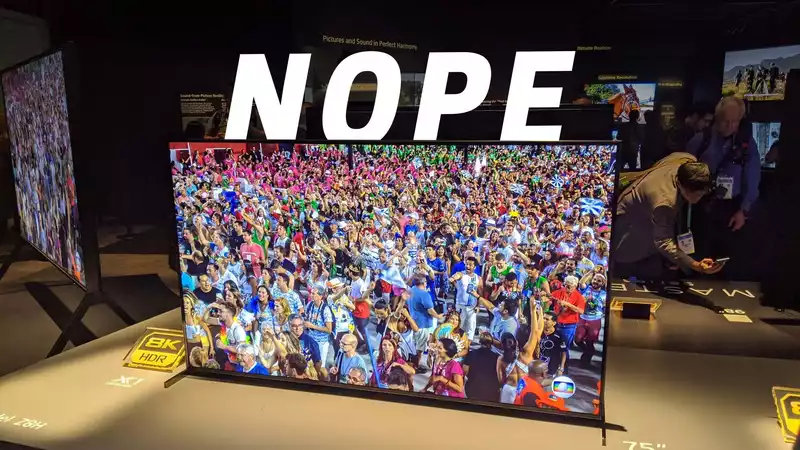I have been paying attention to 8K TVs since Samsung first announced them in 2018 I have seen demos of 8K sets from Samsung, LG, and Sony I have tested and reviewed one 8K TV and have been exposed to several other 8K TVs
And 8K is fantastic When you combine that incredible resolution with one of the largest TV sizes ever sold, you get an experience that is so real, it's like looking through a window The actors walking through the on-screen scenes are human-sized, and the objects are of normal scale This is not just an upgrade to 4K, but an evolutionary step in display technology
Nor is it worth buying Not now, and probably not for years to come
The biggest hurdle facing the proliferation of 8K TVs is price With even the most affordable 8K set costing over $3,000, the majority of TV buyers are not interested, and we can't blame them Some of the models on our list of best 8K TVs cost as much as $20,000 or $30,000
At smaller screen sizes, those that are actually within reach, 8K resolution is less impressive; 8K video is best enjoyed on screens 75" to 100" or larger, and 8K displays are essentially four 4K displays stitched together into one much larger than most 4K TVs in the home, because an 8K display is essentially four 4K displays stitched together into one seamless image Larger screen sizes may become more popular, but an 85-inch TV is too large for most homes [When you consider the new HDMI standard (HDMI 21 is the first standard to support 8K resolution on a single cable) and the massive bandwidth required to stream 8K video (YouTube is still the only option), there is a ladder to jump over for even just an expensive TV There are many
But all of this is a waste of time unless one can view 8K video on a huge 33-megapixel TV screen And this problem is not going away anytime soon
Adoption of new formats takes time The first HD TVs began selling in 1998, but it wasn't until 2008, a full decade later, that all the major Hollywood studios adopted Blu-ray as the new standard for releasing HD movies
The switch to 4K was a little different, from the $24,999 price tag of the Sony XBR-84X900 in 2012 to now, when every set of the best TVs under $500 offers 4K resolution, not to mention smart features, 4K TV hardware is become widely available and affordable faster than almost any consumer technology I can think of
But even with millions of 4K TVs in homes, the availability of 4K media is lower than one might imagine Since most streaming is done at 1080p, streaming in 4K is a premium added value; Ultra HD Blu-ray discs are still sold alongside standard Blu-ray and DVD, and gaming only really caught up with the 4K trend with the PS5 and Xbox Series X The launch of the Xbox Series X was the catalyst for this trend
None of this will come as a surprise to those who follow the TV industry For TV manufacturers, this is definitely not a shock
When I first tested my 8K TV, there was a team of engineers who were apologetic about the lack of testing standards and equipment designed for 8K
Samsung's first 8K TV was so far ahead of the curve that it required multiple HDMI cables to be run to stitch together a mosaic of 4K video, because the HDMI 21 specification was not yet finalized
All told, 8K-land has only just begun There are still big unanswered questions, such as how to make 8K media when the file size is significantly larger than the largest capacity Blu-ray format Raw 8K video reaches 1215 GB per minute, and the highest triple-layer Blu-ray 30 is up to 100 GB Even if they switch to other storage media, they will need to dramatically increase storage capacity at an unprecedented price and scale
In addition, the number of manufacturers producing Blu-ray players is declining; even major manufacturers like Oppo and Samsung have stopped producing players
Who would expect 8K streaming to catch on when average US bandwidth is low enough to make 4K streaming difficult? Is it a huge leap in home bandwidth, advances in compression and media codecs, or both?
It is very likely that 8K has pushed video so far that current storage and data transmission technologies will not soon be able to keep up Or the technological landscape could change dramatically as TV manufacturers and Hollywood studios focus their R&D efforts on making 8K a reality
In any case, there is still much to figure out before purchasing an 8K TV As I said, 8K is an evolutionary step, but there is still much that needs to evolve There will (probably) come a time when we will be recommending the purchase of an 8K TV, but it won't come soon enough










Comments